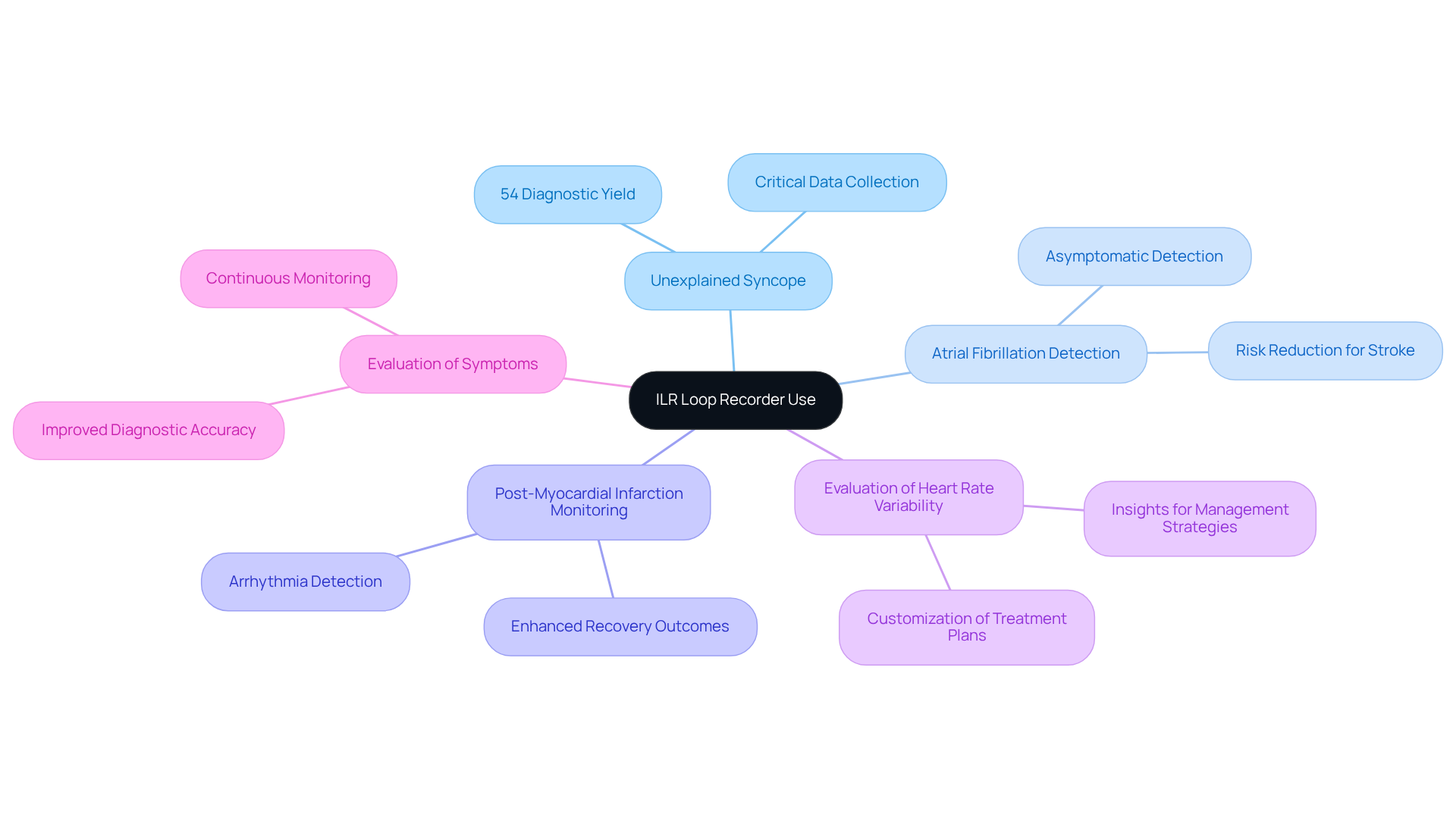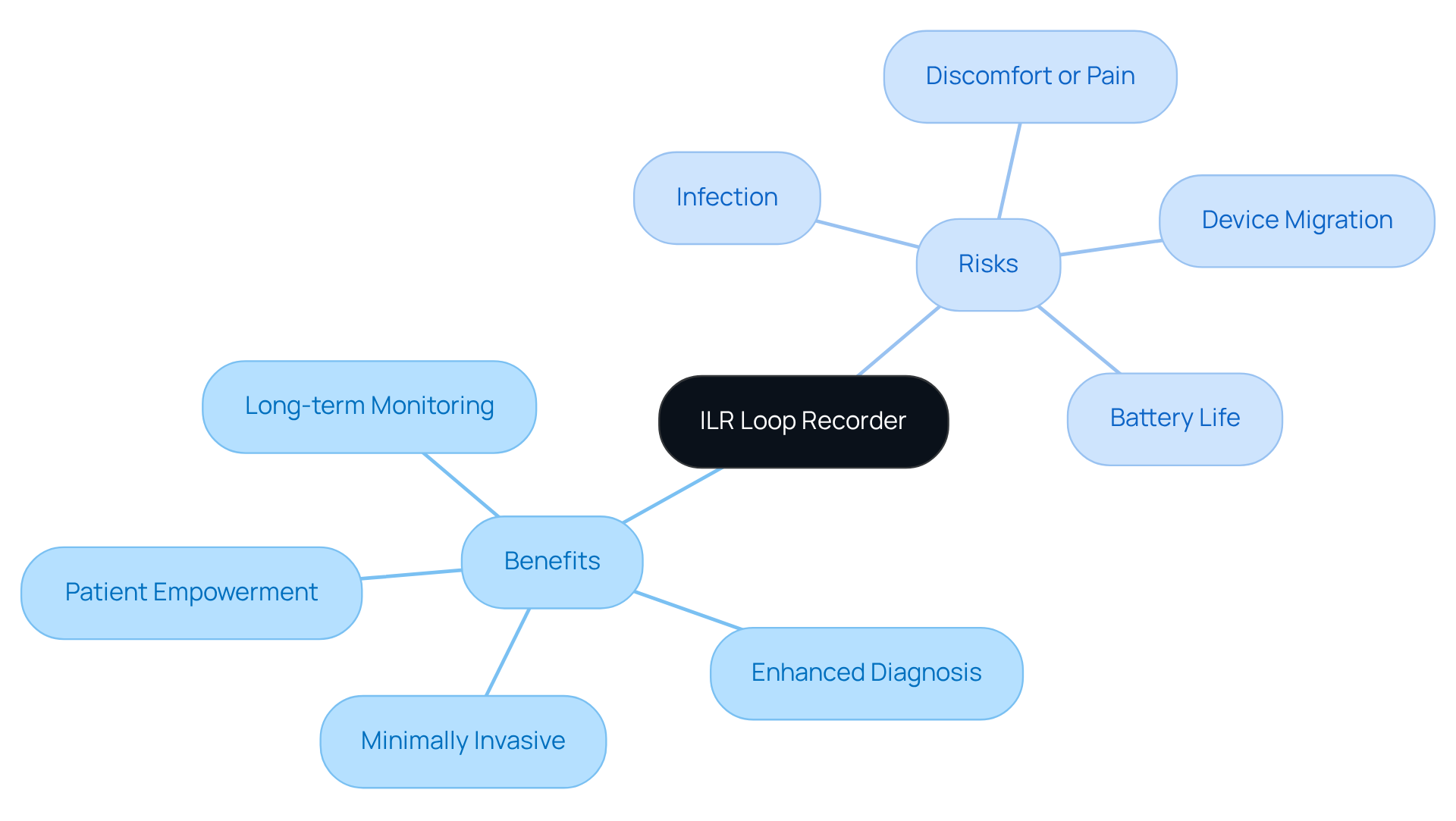


The ILR loop recorder is a small, subcutaneous device that continuously monitors heart activity for up to three years. This innovative tool provides critical data for diagnosing unexplained fainting, palpitations, and arrhythmias, offering peace of mind for those who may have concerns about their heart health.
It's important to understand the benefits of this device. With long-term monitoring, it enhances diagnosis and helps healthcare providers tailor care to individual needs. However, we also recognize that there may be worries about potential risks, such as infection and device migration. Addressing these concerns is vital, and we want you to feel informed and supported.
In addition to the essential monitoring capabilities, the ILR loop recorder plays a significant role in managing cardiovascular health. If you have questions or need further information, please don’t hesitate to reach out. Your health and comfort are our top priorities, and we are here to support you every step of the way.
The heart, often seen as the engine of our bodies, can sometimes show irregularities that go unnoticed by standard monitoring methods. The Implantable Loop Recorder (ILR) stands out as a remarkable solution, offering continuous insight into heart rhythms over extended periods. This is especially helpful for those who experience unexplained fainting or palpitations.
However, it’s essential to understand both the advantages and potential risks associated with the ILR.
Remember, seeking support and understanding is the first step toward taking charge of your heart health.
The ilr loop recorder is a small, subcutaneous device designed to monitor your heart's electrical activity continuously, typically for up to three years. Placed just beneath the skin of your chest, it works like an electrocardiogram (ECG), recording rhythms and spotting any irregularities. This device is especially beneficial for those experiencing unexplained fainting or palpitations, as it captures fleeting heart rhythm disturbances that standard monitoring might miss.
With its compact size and ability to monitor over a long period, the ilr loop recorder is a vital tool for , particularly for older adults who may experience intermittent symptoms. Cardiologists highlight the importance of the ilr loop recorder in providing real-time insights into heart activity, which can significantly enhance the diagnosis of sporadic conditions.
For instance, if you or a loved one has experienced unexplained fainting, the ilr loop recorder can help determine if irregular heartbeats are the cause, allowing for prompt and appropriate treatment. This means you can feel more secure knowing that your heart health is being closely monitored, and any issues can be addressed quickly. Remember, you are not alone in this journey—reaching out for support is a positive step towards better health.

The ilr loop recorder is a valuable tool in various clinical scenarios, especially for individuals experiencing unexplained syncope, palpitations, or those at risk for arrhythmias. It’s important to understand how this device can help you or your loved ones navigate these concerns.
If you or someone you know suffers from unexplained syncope or fainting spells without a clear diagnosis, the ilr loop recorder can monitor heart rhythms during these episodes. This monitoring provides critical data that may lead to a diagnosis. Studies indicate that the ILR loop recorder implantation can achieve a diagnostic yield of over 54% in such cases, significantly aiding in identifying arrhythmic causes.
Atrial Fibrillation Detection: The ilr loop recorder is instrumental in detecting asymptomatic atrial fibrillation, especially in individuals with a history of stroke of unknown origin. Timely identification is crucial, as it can lead to , reducing the risk of future strokes.
In real-world applications, the ilr loop recorder has demonstrated efficacy in diagnosing unexplained syncope and palpitations. Studies indicate that it can identify significant arrhythmias in up to 36.6% of individuals, compared to only 10.8% in traditional follow-up groups. This highlights the significance of the ilr loop recorder in contemporary cardiology, especially for patients with complex symptoms. Amavita's thorough approach not only improves cardiac care but also helps in reducing readmissions, ensuring that you receive the support you need.

The ilr loop recorder offers several significant benefits, particularly for patients with complex cardiovascular conditions, showcasing Amavita's commitment to innovative cardiovascular care.
Long-term Monitoring: Imagine the peace of mind that comes with the ability to continuously record heart rhythms for up to three years. This extensive data collection leads to more accurate diagnoses, particularly for individuals at high risk, enabling focused cardiovascular care through advanced imaging and assessments.
Minimally Invasive: The implantation procedure is relatively simple and often performed under local anesthesia, resulting in minimal recovery time. This aligns with Amavita's focus on same-day convenience, allowing patients to return to their daily lives without prolonged hospital stays.
Enhanced Diagnosis: The ilr loop recorder can identify arrhythmias that might not be captured during standard ECG tests, facilitating improved management of cardiac conditions. This capability is crucial for personalized treatment plans that effectively address common heart concerns.
Patient Empowerment: Patients can access their data and share it with healthcare providers, fostering a collaborative approach to care. This empowerment is a key aspect of Amavita's patient-centered philosophy, ensuring that you are involved in your health journey.
However, it’s important to be aware of the risks associated with the ILR:
Understanding these is crucial for patients considering an ilr loop recorder, especially regarding their overall health and treatment goals. Amavita emphasizes a comprehensive cardiac evaluation approach, ensuring you have the support and information you need to make informed decisions about your care.

The implantable loop recorder (ILR) is a remarkable advancement in cardiac care, offering continuous monitoring of heart rhythms for extended periods. This small, subcutaneous device not only assists in diagnosing unexplained fainting and palpitations but also provides invaluable insights into heart health. This empowers both patients and healthcare providers to make informed decisions.
In addition to this, the various applications of the ILR are highlighted, showcasing its effectiveness in:
With a diagnostic yield exceeding 54% for unexplained syncope, the ILR truly proves to be a game-changer in identifying and managing complex cardiovascular conditions. While the benefits are substantial, including long-term monitoring and minimally invasive procedures, it is equally important to be aware of the associated risks, such as infection and device migration.
Ultimately, the ILR loop recorder signifies a significant leap forward in cardiovascular health management. By understanding its benefits and potential risks, individuals can engage more actively in their health journeys. Embracing this technology can lead to better outcomes, enhanced patient empowerment, and a proactive approach to heart health. For those experiencing unexplained symptoms, seeking consultation about the ILR could be a vital step toward improved well-being and peace of mind.
What is an Implantable Loop Recorder (ILR)?
The Implantable Loop Recorder (ILR) is a small, subcutaneous device designed to continuously monitor the heart's electrical activity for up to three years.
How does the ILR work?
The ILR is placed just beneath the skin of the chest and functions like an electrocardiogram (ECG), recording heart rhythms and identifying any irregularities.
Who can benefit from an ILR?
The ILR is particularly beneficial for individuals experiencing unexplained fainting or palpitations, as it can capture fleeting heart rhythm disturbances that may be missed by standard monitoring.
What are the advantages of using an ILR?
The ILR's compact size allows for long-term monitoring of heart activity, which is crucial for managing cardiovascular health, especially in older adults who may have intermittent symptoms.
How does the ILR enhance diagnosis?
By providing real-time insights into heart activity, the ILR significantly improves the diagnosis of sporadic conditions, helping to determine if irregular heartbeats are the cause of unexplained symptoms.
What should you do if you experience unexplained fainting?
If you or a loved one has experienced unexplained fainting, consulting a healthcare professional about the ILR can help identify potential irregular heartbeats and facilitate prompt treatment.